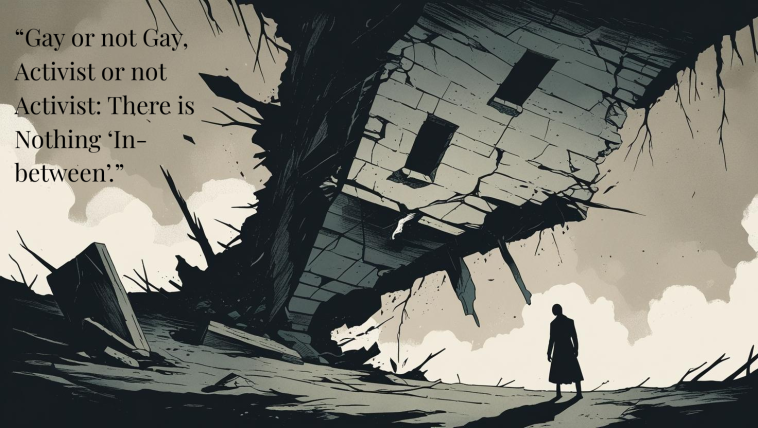As a young Ugandan writer, I have always thought, though naively, that there would never come a time when I have to address a sect of activists who do not know where they belong—people whose activism should be questioned, as it is clear that in most cases, especially in times of political uncertainty like these, where there is no point in neutrality, everyone sane knows where they stand.
Uganda today sits on a ticking bomb; and unfortunately, her limbs are so cuffed that she has no way to escape—the political class, together with its brownnosers, crunch Uganda’s liberties in search of their own lost identities, even when they can find themselves without depriving her of her freedom. But as is the case with narcissism, satisfaction is derived from the sufferance of others.
It is thus a grim sign when an ordinary man is in a position to identify the fissures of a country’s political system, when, however ignorant, such a man can lay bare the many failures of a regime—then we can tell that a government is a lifeless carcass awaiting its committal. It is even worse when a man loses confidence in that government; when he finally comes to terms with the fact that idiots and crooks are in charge of the country’s politics.
Often, we do not need binoculars or extra eye lenses to see the mess; to conclude that a nation slouches towards Golgotha for its crucifixion and that not even Jehovah of Nazareth can save it; we do not need to stutter about the dwindling democracy and the death of a pinch of justice—we dance to it as it plays—it screams out loud.
In times of political tribulation, a government is more focused on neutralising truth-tellers than fighting corruption, but even with this, its shortcomings are still visible; the broken health and education systems are national treasures; infrastructure incessantly screams for rescue; the courts of law are compromised and thus justice is served in bits; abduction and torture of citizens by the arrogant security forces become a song, and murder of opposition figures and dissenting voices is justified. And we are in these times, and there is no going back unless Ugandans unite against the system.
Even with this sort of evidence, some activists, who claim to be at the forefront of holding the system accountable, are undecided and trapped between being activists and enablers of the same evil they pretend to detest.
By inference, one might say that Ugandan activism is a means of satisfying one’s interests—it is almost impossible to encounter a freedom fighter or advocate whose goal is spearheading a genuine cause. Often, they are running a personal organisation that helps them connect with the donor world, or fight their vendettas.
It is only in Uganda that you find an activist who can barely tell or defend what they stand for if confronted logically. There is always a lack of consistency—there is no integrity in the Ugandan activism space. Activists are always fighting others for doing activism differently. They are always accusing other activists of getting money from donors. It is always that kind of talk. It is always about who is a better activist.
For weeks now, there has been a swift shift in a certain gay man’s activism. He’s a young man of my age, I presume. As a writer who has written about human rights and inclusivity, and interviewed gay advocates, I am perplexed by his lack of consistency. He’s been a critically growing voice in advocacy—he’s written a few letters to Muhoozi and his father, President Museveni, questioning their insensitivity in such times of the country’s political trials. His stance on our country’s politics was striking until a few days later when he started glorifying the same things and people he had condemned.
Whereas it is true that in most cases while fighting beasts, man ends up with or as a beast, it is also a question of morality and integrity—one’s intentions are clear right from the start, whether they want to become a beast or not, and when one becomes a beast in the process of fighting beasts, then they were initially beasts but only enveloped in cocoons.
Many of us were shocked to see Ronald, a gay man who has been criticising Museveni for his tyranny and the LGBTQ law, praising the same person and urging us to vote for him, even after his forty-year barren reign. More shocking, when this young man blamed Bobi Wine for what he called “dissociating with gay” and claimed that Museveni was still better.
As a critic, there are more questions than answers; since when has Bobi Wine ruled this country? Since when has Bobi Wine passed the LGBTQ law? Since when has Bobi abducted and killed Ugandans for supporting the opposition, that now it’s his fault? Since when has Bobi deprived Ugandans of their rights?
Someone unfamiliar with Ugandan activism would say Ronald is a state agent, who all along, has tried to confuse people who are focused on the liberation struggle of Uganda. And if this be activism, it’s the cancer that is eating up the genuine spirit of patriotism.
Of course, the world will not dance to your expectations’ tune. There will always be people with diverging opinions, and as an activist, you only have to accept these realities and remain true to yourself. Integrity cannot be traded for anything. Truth is non-negotiable.
And there is nothing in between. It is simple mathematics; you are either gay or straight, an activist or not…pastor or traditionalist; you cannot be both at the same time. It is either you are for the people or with their oppressor—there is no lenience in trying to be both.
So, dear activist and politician, the choice is an easy one in times of this political mess, where do you stand—with the vanquished or against the vanquished?
This post was created with our nice and easy submission form. Create your post!







